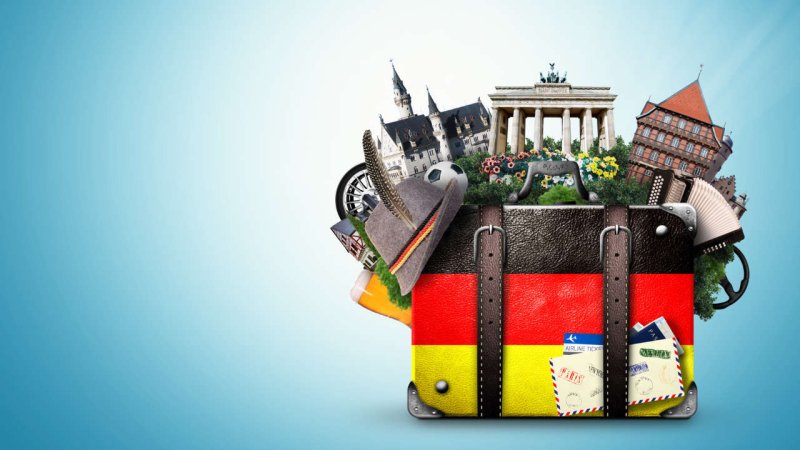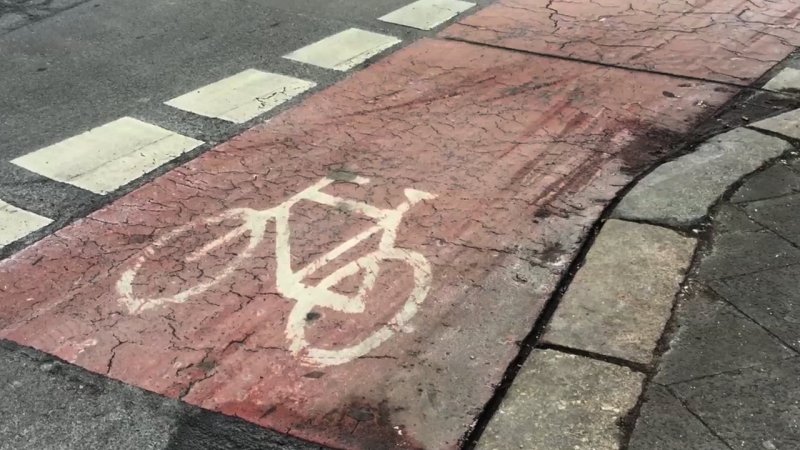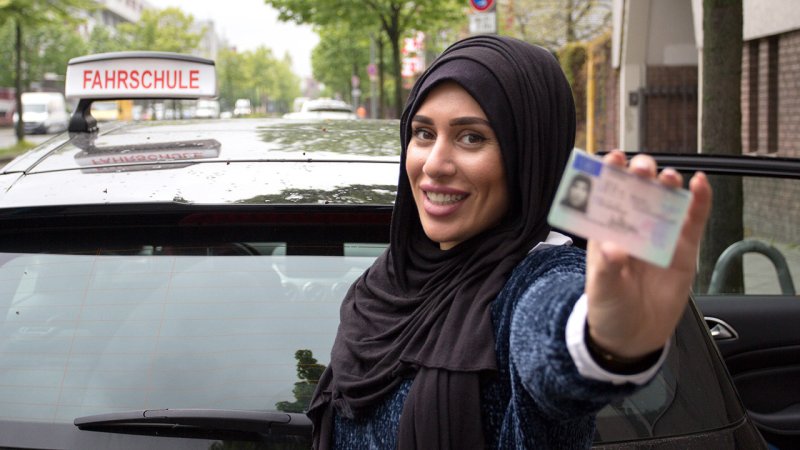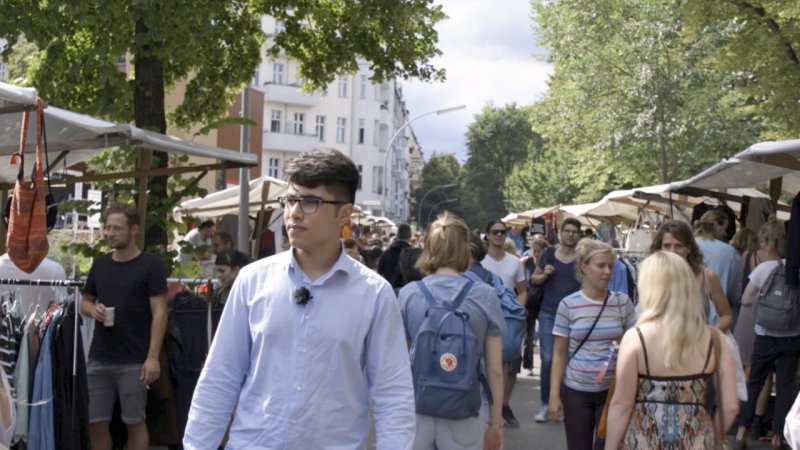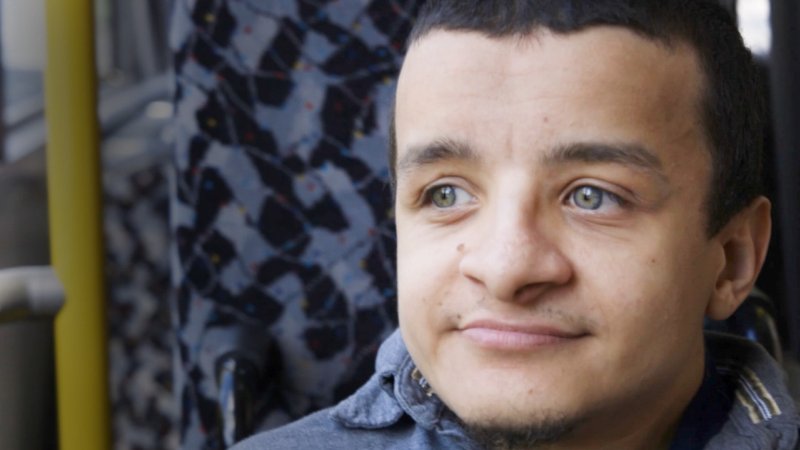To travel around in Germany, you do not necessarily need a car. You can comfortably move within a city or between cities by buses and trains.
Important: Since May 2023, you can travel throughout Germany with the “Deutschland-Ticket”, also known as the “€49 Ticket”. You can find more information in the “’Deutschland-Ticket’/ €49 Ticket” section below.
Buses, underground trains, S-Bahn trains and trams (in some cities they are called "Straßenbahn") are part of "public transport". To use them, you have to buy a ticket.
Ticket machines may look different in every city. In many buses, drivers sell tickets directly, but only for cash. In many buses, you can only pay with coins or small notes (€5 or €10). With larger ones, it may happen that the bus drivers cannot give you change. Tickets are also sold at some kiosks or in select shops, which you can recognise by the symbol or logo of the transport company of the respective city. In some cities, you can also buy tickets using a specific mobile app.
There are different types of tickets. Some are valid for a few hours, either for a one-way trip or for return trips. Some others are valid for a day ("Tageskarte"), a week ("Wochekarte") or a whole month ("Monatkarte"). Furthermore, there are different "Tarif zones" which indicates how far you can travel with a ticket.
When you buy a ticket valid for a few hours or a day, in many cities, you will have to "validate" it at specific machines available on train platforms. You can also find these machines inside some buses or trams. If the date and time stamp already exist on a ticket, usually there is no need for validation.
Children, pupils, students, senior citizens and people who receive benefits from the Social Welfare Office or Jobcentre, can profit from discounted public transport tickets. You can buy these discounted tickets at the machine or in the designated shops. There, you can also inquire about the document(s) you need to present to buy a discounted ticket.
If you live in a smaller town or village, it is always easy to move around without a car. Larger cities usually have a train station, from which you can take the train to other towns and cities, as well as bus stations. Smaller villages often only have a bus connection. Some even do not have any form of public transportation.
You can buy tickets for the train online in advance or directly at the station. There are ticket machines where you enter your destination and find out the price. As soon as you pay -in cash or with an EC card - your ticket will be printed out. There are usually conductors who check the tickets on trains. On some trains, you can buy a ticket AFTER boarding- but make sure to inquire beforehand whether it is possible. If the conductor catches you on the train without a ticket, you must pay the penalty. You can find out more in the section "What happens if I travel without a valid ticket?"
You can usually buy tickets on the bus directly from the bus driver. To do so, you just need to mention your destination and pay the indicated cost.
If there is neither a train station nor a bus connection in your area, unfortunately, you will not have too many options. If the nearest bus or train station is not far away, you can get there by bike. To read more about using bikes in Germany, check our chapter "Cycling".
For urgent appointments, you may be able to ask neighbours or acquaintances with a car to help you. In emergencies, you can also order a taxi - keep in mind that it will probably be quite expensive. You can find a taxi company by googling the word "taxi" and the name of your city.
The "Deutschland-Ticket", also known as the "€49 Ticket", is the successor of the "€9 Ticket". Since May 2023, you can use the "Deutschland-Ticket" to travel with buses, trams, U-Bahn, S-Bahn and regional trains throughout Germany. You CANNOT use the ticket to travel on long-distance buses, IC/EC or ICE trains.
The ticket costs €49 per month and is only available as a subscription. It is non-transferrable, that means you may not lend it to anyone. In addition, you cannot take other people with you on the ticket. Only children up to the age of 6 travel for free.
You can purchase the “Deutschland-Ticket” digitally as a mobile phone ticket or as a chip card. The subscription can be cancelled monthly, i.e., you can cancel it at the end of a month.
You can buy the ticket subscription on the websites of your regional public transport companies, on the DB website, in the DB Navigator app, in the DB travel centres or via the Deutschland Ticket app.
Important: If you already have a subscription with your regional transport company, inform yourself in advance about how you can switch. Some subscriptions are automatically converted to the "Deutschland-Ticket", but for others, you have to take action.
So far, only a few states and cities have decided to offer a cheaper "Deutschland Ticket" or additional tickets:
- In Bavaria, from September 1st, 2023, students can get the "Deutschland Ticket" for €29.
- In Dresden, only in the „Verkehrsverbund Oberelbe“, you can take an adult and up to four schoolchildren (up to the age of 15) to board public transportation with you for an additional €10 per month.
- In Hesse, the discounted ticket costs €31. It is a ticket for people who receive “Bürgergeld”, social benefits, housing benefits or asylum seeker’s benefits in the state of Hesse.
- In Hamburg, students obtain the ticket for €19 and trainees can benefit from a "bonus ticket" for €29 while the rest of the expense is paid for by the workplace. People with a low income can buy the ticket in Hamburg for €19.
- In Hanover, people who receive social benefits from the state (holders of the so-called “Region-S-Karte”) pay €30.40 for the „Deutschland Ticket“.
- In Mecklenburg-Western Pomerania, trainees and volunteers can buy the „Deutschland Ticket“ for €29. The same price applies to seniors aged 65 and over.
- In NRW, from 2023/2024 school year, the „Deutschland ticket“ will cost €29 for schoolchildren and trainees. People who receive social benefits from the state should pay €39 for the ticket from autumn.
- In Saarland, students, trainees and those working as volunteers can get a „Deutschland ticket“ for €30.40 euros (the so-called “Junge-Leute-Ticket”).
- In Stuttgart, there is a so-called „TicketPlus“: For an extra €9.90 per month you can take other people with you or lend your ticket to someone else.
Other federal states or cities have not yet announced any concrete decisions for such measures. (Status: August 2023)
Please note: The "Deutschland-Ticket" is in your name and is only valid with an official photo ID. This can be an identity card, a disability card, a passport, a substitute ID card (e.g., travel document for foreign nationals) or a driving licence valid in Germany.
For students: Ask the AStA (General Student Committee) at your university whether you can switch to the “Deutschland ticket“. Some colleges offer an upgrade.
All the means of public transport have a sort of ticket inspections. Sometimes inspectors wear uniforms and some other times they are dressed like regular passengers. The inspectors have to identify themselves and check the tickets of all passengers. They usually announce their presence, saying "Fahrscheinkontrolle" or "Die Fahrscheine bitte". If you do not have a valid ticket, you will need to show your ID, and the controller will pick up your name and address to issue you a fine notice. The amount of fine varies from city to city, but is currently somewhere between €40 and €80. Do not try to run away if you are caught without a ticket. The inspectors will quickly follow you and also contact the police. You may receive a fine notice per post - the subject of such a letter will contain the terms "Beförderungserschleichung" or "Erschleichung von Leistung", which means "riding without a valid ticket" or "illegal riding".
Each transportation company has its own regulations ("Beförderungsregeln"). These regulations indicate, for instance, where prams or bicycles can stand, which bus door people can use to board or whether drinks and food are allowed. Not all passengers take these rules very strictly. However, it is essential to know what is permitted and what is not.
If you are caught riding public transport illegally several times or fail to pay the fine, you may be criminally charged, which may lead to a court sentencing you to a higher fine or even a prison term. Keep in mind that such a conviction can also affect your right of residence in Germany.
This App provides you with all you need to know about the German traffic regulations.
Mit der Deutschlandticket-App können Sie das Deutschlandticket einfach kaufen, bequem verwalten und immer dabei haben.
